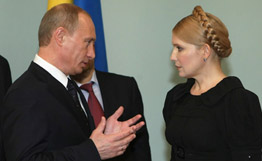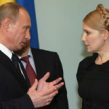
Moscow Pressuring Ukraine on its EU Pipeline Deal
Publication: Eurasia Daily Monitor Volume: 6 Issue: 89
By:

Ukrainian Prime Minister Yulia Tymoshenko, commencing talks with her Russian counterpart Vladimir Putin in Moscow on April 29, said that a "certain confrontation" in the gas trade between the two countries will soon become history. She had planned to meet Putin on April 8, but Moscow re-scheduled the visit in the wake of the March 23 Ukraine-EU agreements on modernizing Ukraine’s gas pipelines -which Moscow rejected. There was apparently no confrontation in Moscow this time, but Tymoshenko achieved less from her visit than she expected. The only promise that she secured from Putin was that Ukraine will not be fined for buying less gas in January-April. However, she failed to secure either a $5 billion loan or an agreement on gas for storage in the underground reservoirs for next winter.
At the start of the talks, Tymoshenko thanked Putin for allowing Ukraine to buy less gas from Russia this year. Ukraine had pledged to buy 5 billion cubic meters (bcm) of gas in the first quarter, but bought only 2.5 bcm because the Ukrainian industry, whose output shrank by more than 30 percent in the period, could not consume the agreed volumes. The January 2009 contracts between Naftohaz Ukrainy and Gazprom provided for fines in such cases. Putin estimated the fine, including for an unspecified amount of gas that Naftohaz failed to buy in April, at $2 billion, but he said it would not be applied as Russia understands that Ukraine is in a difficult situation due to the global recession (UNIAN, April 29). This was the only positive result achieved by Tymoshenko in Moscow.
Tymoshenko failed to obtain a definite answer to her earlier request for a $5 billion loan. The cash-strapped Naftohaz, had expected that the loan would be used to buy Russian gas. However, Putin said that additional consultations were needed on this (Interfax-Ukraine, April 29). The Ukrainian weekly Zerkalo Nedeli reported on April 30 that Russia agreed to lend $5 billion to Ukraine, with the condition that $3 billion will be used to buy gas. Ukraine’s Deputy Prime Minister Hryhory Nemyrya, denied this saying that "this issue was not discussed in this context during the talks" (5 Kanal TV, April 30).
Putin and Tymoshenko agreed on a deal whereby 0.8 bcm of Russian gas would be pumped into Ukraine’s underground storage facilities for the winter in exchange for a respective sum in fees for the transit of Russian gas across Ukraine to the EU. That was far less than the 19.5 bcm of gas that Tymoshenko had hoped to secure in exchange for transit fees over a longer period. Putin gave no clear answer, but he noted that this quantity of gas would cost exactly as much as Tymoshenko wanted to borrow from Russia -$5 billion. He suggested that Ukraine should try to borrow that sum from the EU, and he said that Gazprom was reluctant to pay Naftohaz with gas for transit for several years ahead, fearing complications in the event of Naftohaz’s possible reorganization (UNIAN, April 29).
The 17 bcm of gas that had been kept in the underground reservoirs in western Ukraine from 2008 were instrumental for the country’s survival in January, when Russia stopped the gas supplies for two weeks over a price dispute. While Ukraine was consuming gas from its reservoirs, several Balkan countries were left to freeze in the absence of Russian gas, which is pumped through Ukrainian pipelines. The storage gas was bought from Russia at $179.5 per 1,000 cubic meters in 2008, which allowed Ukraine to purchase less gas in the first quarter when Russian gas prices reached $360.
Talks on both the loan and gas for underground storage will continue between the two governments. In the meantime, Tymoshenko used the opportunity, however, to make several statements pleasing to Russia. She said that Ukraine was no longer selling arms to Georgia and was not planning to resume these sales (Interfax-Ukraine, April 29). Ukraine did sell arms to Georgia ahead of the Russian-Georgian conflict in August 2008, which exacerbated existing tensions in the relationship between Moscow and Kyiv. Tymoshenko also promised to "minimize" any protectionist measures in bilateral trade with Russia amid the global recession, and to do her utmost to support Russia’s aim to join the WTO (Interfax, April 29). Ukraine joined the WTO in May 2008, which Russia hopes to do in 2010.
Russia and Ukraine apparently agreed to differ on the plans to upgrade Ukraine’s gas pipelines that carry Russian gas to Europe. Putin reiterated his earlier proposal, which was suggested in 2002, involving the idea of an international consortium to manage Ukraine’s pipelines. In this case Russia would play a major role in the consortium, rather than the minor role assigned to it in the projects to upgrade its pipelines agreed between Kyiv and the EU on March 23. Tymoshenko invited Russia to participate in the Ukraine-EU projects by supplying pipes and other equipment (Interfax-Ukraine, April 29).




